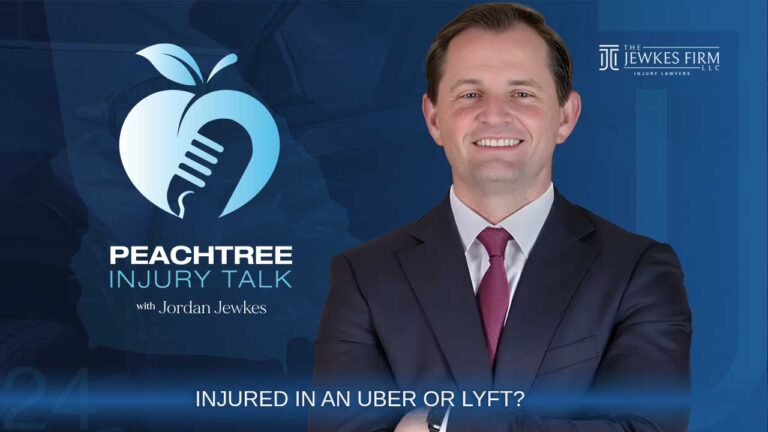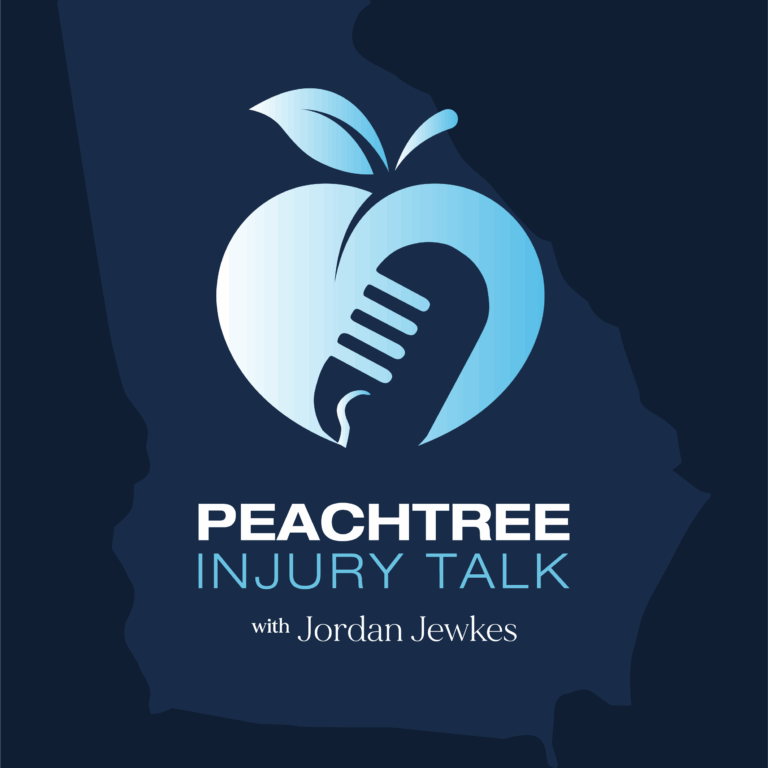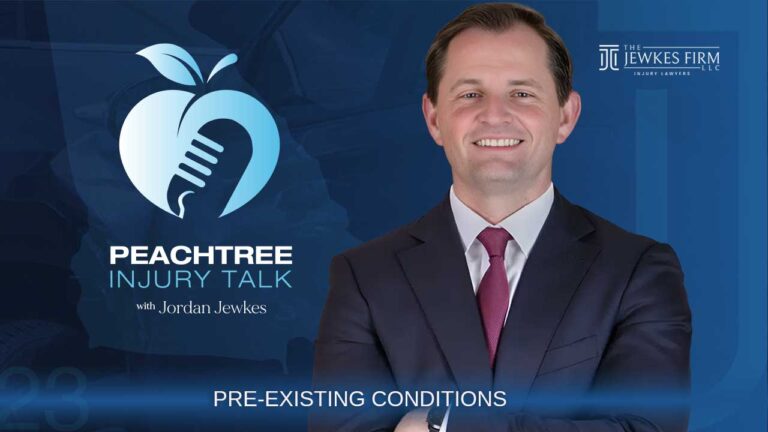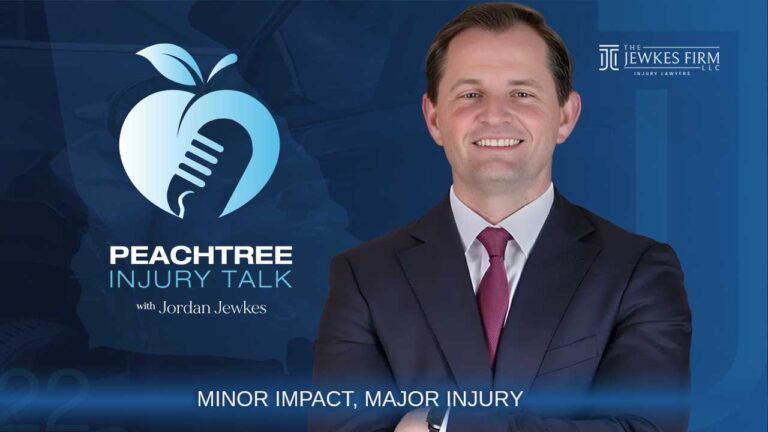
Injured in an Uber or Lyft? What Georgia Riders Should Know
In this episode of Peachtree Injury Talk, attorney Jordan Jewkes discusses the legal complexities surrounding accidents involving rideshare services like Uber and Lyft. He explains
Home | Podcasts | Peachtree Injury Talk | Medical Malpractice in Georgia — What Makes a Case, And What Doesn’t
Peachtree Injury Talk with Jordan Jewkes
In this episode of Peachtree Injury Talk, attorney Jordan Jewkes discusses medical malpractice law in Georgia, explaining that malpractice occurs when a medical professional violates the standard of care, causing significant injury. Jordan clarifies the difference between unavoidable complications and negligence, noting that known risks of procedures do not constitute malpractice. He outlines common errors leading to claims, such as misdiagnosis, surgical mistakes, and retained surgical objects. While dental malpractice is governed by similar standards, it is often harder to prove due to typically less severe outcomes. Proving malpractice requires expert testimony to demonstrate breach of care, causation, and significant injury, making these cases challenging and costly compared to general personal injury claims. Georgia law requires expert affidavits before filing suit to prevent frivolous claims. Jordan advises those suspecting malpractice to act promptly due to strict statutes of limitation and to consult qualified malpractice attorneys early for proper case evaluation.
| 00:00 | Narrator: Welcome to Peachtree Injury Talk with Attorney Jordan Jewkes. |
| 00:05 | Evan Mack: Welcome back to Peachtree Injury Law Talk with Jordan Jewkes. Jordan is dedicated to giving injured victims a voice and providing strong advocacy against an often broken system. As a seasoned trial lawyer and former insurance defense attorney, he now uses that insider knowledge to fight for injury victims across Georgia. Today, we're discussing medical malpractice: how it’s defined under Georgia law, the difference between a bad outcome and true negligence, and what you need to know before pursuing a claim. Welcome back, Jordan. |
| 00:40 | Jordan Jewkes: Thanks, Evan. Glad to be here. |
| 00:52 | Evan Mack: Let’s start with the basics. What legally qualifies as medical malpractice in Georgia? |
| 00:59 | Jordan Jewkes: Great question. I love this topic. I’ve spent many years working on medical malpractice cases—mostly for injured patients. In Georgia, like in most states, medical malpractice occurs when a medical professional—whether a doctor, nurse, or anyone in the healing arts—violates the standard of care. That means they fail to do what another professional with similar training and experience would do under similar circumstances. Think of it this way: in medical school, you’re taught certain procedures and standards. If a professional deviates from those standards and it causes harm, that’s malpractice. |
| 02:18 | Evan Mack: You mentioned that not every bad outcome is malpractice. How do we differentiate between a complication and true negligence? |
| 02:24 | Jordan Jewkes: In law, there’s something called a known and accepted risk of a procedure. If a complication happens that’s a recognized risk—something that can occur even if the procedure was done correctly—then it generally isn’t malpractice. For example, take a simple blood draw. Before the procedure, you might be told there’s a small chance of bruising, vein damage, or even very rarely, death. These are known risks. Even if the nurse or doctor follows the standard of care perfectly, these complications may still happen. So, a complication is a bad result that occurs despite proper care. It’s like winning the wrong lottery ticket—something that statistically happens sometimes, but it’s not due to negligence. This "known risk" defense is something doctors and insurers often use in malpractice cases. |
| 04:37 | Evan Mack: What kinds of medical mistakes are more likely to lead to winning a malpractice claim? Surgical errors, misdiagnosis, medication mistakes? |
| 04:53 | Jordan Jewkes: The list is quite broad. Here are a few examples: - A cardiologist failing to read an EKG properly, missing signs of a heart attack that could have been prevented. - Retained surgical objects: sometimes sponges, instruments, or even parts of gloves are accidentally left inside a patient, sometimes for years, causing infection or other damage. - Wrong-site surgery, such as amputating the wrong limb. This is rare but happens, which is why surgeries now involve clear markings on the body. Safety protocols today have reduced some of the bigger risks from decades ago, but errors still happen. |
| 07:11 | Evan Mack: Are dental malpractice cases handled under the same rules as medical malpractice? They seem similar but maybe not quite the same. |
| 07:21 | Jordan Jewkes: Yes, dental malpractice falls under similar laws but tends to be harder to win. The success rate is generally lower because dental procedures usually aren’t life-threatening and may have less severe consequences. For instance, a crown falling off after a year is often still considered successful treatment. Many dental injuries can be corrected with further treatment. To prove dental malpractice, you still have to show the dentist violated the standard of care and caused permanent injury — which is tougher when the injury isn’t significant. |
| 08:29 | Evan Mack: How do you prove that a provider’s actions actually caused harm, rather than just something going wrong due to assumed risk? |
| 08:48 | Jordan Jewkes: First, I’m not a doctor, so I have to rely on medical experts. When someone comes to me suspecting malpractice, there are generally three key elements we need to prove — think of it like a three-legged stool: 1. The doctor violated the standard of care. 2. That violation caused the injury (causation). 3. The injury was significant. If any one of those legs is missing, the case doesn’t stand. For example, amputating the wrong arm is clearly a violation that directly causes harm. For causation, experts review medical records and testify whether the breach directly led to the injury. Typically, malpractice cases involve significant or permanent injuries — minor or temporary issues usually aren’t enough to justify the costs. |
| 11:58 | Evan Mack: Are medical malpractice cases harder to win compared to general personal injury claims? |
| 12:05 | Jordan Jewkes: Absolutely. They’re much more difficult. Most medical malpractice calls we get—90 to 95%—are cases we can’t take. Car accident claims are often easier to evaluate and pursue unless the person was at fault or uninjured. Statistically, doctors win most malpractice trials. It takes deep knowledge of both medicine and law, and often collaboration among attorneys with specific expertise. Plus, malpractice cases are very expensive to pursue because you need expert witnesses—doctors or dentists—to review the case and provide testimony or affidavits. |
| 14:16 | Evan Mack: How does Georgia handle expert witnesses, pre-suit requirements, or caps on damages in these cases? |
| 14:27 | Jordan Jewkes: Georgia requires an affidavit from a medical expert with similar training who can attest that the defendant violated the standard of care and caused the injury. This affidavit must usually be attached before filing suit—a process designed to prevent frivolous claims. Often, multiple experts are needed, especially if several doctors or specialists were involved in the care. The law was changed in the mid-2000s to add these requirements to filter out weak cases. |
| 16:10 | Evan Mack: Have you ever accepted a case another lawyer declined because they thought it was unwinnable or not worth pursuing? |
| 16:24 | Jordan Jewkes: Yes, it happens. Many people first consult general practice attorneys or lawyers who don’t specialize in malpractice, and those attorneys often turn them away. Sometimes, a case clearly shows a violation and causation, but the injury isn’t severe or permanent enough to justify the high costs of pursuing the claim. In those cases, some attorneys refuse them for financial reasons. But occasionally, we see angles or approaches others missed and can pursue them with some hope of success. |
| 18:01 | Evan Mack: For someone who believes they’ve been harmed by a medical provider, what should they do or avoid before calling you? |
| 18:11 | Jordan Jewkes: Don’t wait too long. The statute of limitations in Georgia is generally two years from the date of the injury, and these cases often take a while to prepare. Calling at the last minute might mean there’s not enough time to act, even if the case is strong. If you suspect malpractice, talk to a qualified medical malpractice attorney as soon as possible. We can review your records and consult experts to see if you have a viable claim before investing heavily. |
| 19:26 | Evan Mack: Jordan, thank you so much for your time today. |
| 19:28 | Jordan Jewkes: Thank you, Evan. Always a pleasure. |
| 19:32 | Evan Mack: And thanks to everyone who joined us on Peachtree Injury Talk with Jordan Jewkes. To learn more or connect with Jordan and his team, visit JewkesFirm.com. Don’t forget to like, subscribe, and leave a review if you found this information helpful. |
| 19:53 | Narrator: Thanks for watching. Be sure to hit that like and subscribe button and leave us a review in the comments. |

Peachtree Injury Talk is a podcast by Kevin Rosenquist featuring legal insights and practical advice from Georgia-based attorney Jordan Jewkes. The show focuses on personal injury law, offering listeners expert guidance on navigating insurance claims, understanding legal processes, and protecting their rights after an accident. Each episode dives into real-life case examples, common challenges injured individuals face, and actionable tips for dealing with insurance companies and legal hurdles.
Episode Summary
In this episode of Peachtree Injury Talk, attorney Jordan Jewkes discusses the legal complexities surrounding accidents involving rideshare services like Uber and Lyft. He explains that liability typically depends on who is at fault and that rideshare companies provide substantial insurance coverage—usually around $1 million—when their drivers are operating with the app active. Jordan emphasizes the importance of immediately calling 911, seeking medical care, documenting the accident scene, and avoiding private settlements with drivers. He also highlights challenges in suing Uber or Lyft directly due to the independent contractor status of drivers and the prevalence of mandatory arbitration clauses. For passengers, drivers, or pedestrians involved in rideshare accidents, Jordan advises caution and thorough documentation to ensure proper insurance claims and compensation.
Timestamps
00:00 – Introduction to Peachtree Injury Talk
00:10 – Overview: Ride Share Accident Liability
00:39 – Determining Legal Responsibility and Insurance Liability
01:49 – Insurance Coverage for Passengers in Georgia
02:47 – Filing Claims and Insurance Layers for Ride Share Accidents
03:52 – Steps to Take Immediately After a Ride Share Accident
04:35 – Advice for Pedestrians and Bicyclists Hit by Ride Share Vehicles
05:39 – Common Mistakes After Ride Share Crashes
06:50 – Can Uber or Lyft be Sued Directly in Georgia?
08:11 – Complexities in Handling Ride Share Accident Cases
09:55 – Safety Tips for Ride Share Users in Georgia
10:58 – Closing and Contact Information
About the Show
Peachtree Injury Talk is hosted by attorney Jordan Jewkes, who is dedicated to giving injury victims a voice and fighting for their rights against an often unfair system. Each episode provides valuable legal insights and practical advice for those navigating personal injury claims.

Medical Malpractice in Georgia — What Makes a Case, And What Doesn’t discusses the nuances of medical malpractice law in Georgia. Jewkes, an experienced trial lawyer and former insurance defense attorney, uses his insider knowledge to advocate for injured victims navigating the often complex and challenging landscape of medical malpractice claims.
Jewkes begins by defining medical malpractice under Georgia law as a situation where a medical professional—such as a doctor, nurse, or other healthcare provider—violates the “standard of care.” This standard refers to the level of care and skill that a similarly trained professional would provide under comparable circumstances. If the provider fails to meet this standard and harms a patient as a result, it may constitute medical malpractice. He stresses that this is not simply about a bad medical outcome but about whether the care given fell below accepted professional norms.
Explaining the difference between a complication and negligence, Jewkes notes that not every adverse result from medical treatment is malpractice. Known and accepted risks of procedures—such as bruising from a blood draw—can occur even when providers follow standard care. Courts do not consider these recognized risks negligence since they can happen without error, whereas malpractice implies a departure from accepted practices causing harm.
Jewkes identifies several types of medical errors that commonly lead to successful malpractice claims, including surgical errors (such as wrong-site surgery), failure to properly interpret diagnostic tests, and retained surgical tools left inside a patient post-operation. Although safety protocols have improved over time, such serious errors still occur. When it comes to dental malpractice, Jewkes highlights that while dental cases fall under similar legal principles as medical malpractice, they are typically harder to win due to generally less severe and less permanent injuries.
To prove medical malpractice, there must be clear evidence on three critical points: the provider violated the standard of care, the violation caused the injury (causation), and the injury was substantial or permanent. These three elements form a “three-legged stool” that a case must demonstrate for it to proceed. Jewkes relies heavily on expert testimony from medical professionals to establish these points, because laypersons cannot ordinarily interpret complex medical decisions.
Jewkes acknowledges that medical malpractice cases are more difficult to win than many other personal injury claims. Most calls they receive do not meet the high evidentiary threshold required. Malpractice litigation generally demands costly expert witnesses and specialized legal knowledge. Under Georgia law, claimants must file an expert affidavit before initiating a lawsuit, certifying that a medical expert believes a standard of care violation occurred. This pre-suit requirement, introduced in the mid-2000s, helps weed out weak or frivolous claims.
Attorney Jewkes occasionally takes on cases that other lawyers have declined, often due to financial considerations or insufficient severity of injury. However, he sometimes discovers new angles that provide hope for success. For potential claimants, his strongest advice is not to delay seeking legal counsel because Georgia typically imposes a two-year statute of limitations on malpractice cases, and these claims require extensive preparation.
In closing, Jewkes encourages anyone suspecting medical malpractice to consult with a qualified attorney promptly. This allows early review of medical records and expert evaluation to assess the viability of a claim. The conversation aims to empower injured patients with knowledge and realistic expectations about pursuing medical malpractice claims under Georgia law and how to identify legitimate negligence versus unfortunate but recognized medical risks.
To learn more or contact attorney Jordan Jewkes and his firm, go to jewkesfirm.com. The episode underscores the importance of professional legal guidance in holding healthcare providers accountable while navigating the complexities of medical malpractice litigation. For more information, reach out to The Jewkes Law Firm at (770) 771-5130.
This show is designed to deliver general information regarding the law. Our guests will not provide tailored legal advice. If you have a personal issue and need legal support, get in touch with us for a free consultation with a Jewkes Firm attorney.
Subscribe to our newsletter for essential updates and expert legal advice.

In this episode of Peachtree Injury Talk, attorney Jordan Jewkes discusses the legal complexities surrounding accidents involving rideshare services like Uber and Lyft. He explains

In this episode of Peachtree Injury Talk, attorney Jordan Jewkes discusses the impact of pre-existing conditions on injury claims. A pre-existing condition is a medical

In this episode of Peachtree Injury Talk, attorney Jordan Jewkes from the Jewkes Firm discusses the reality of injuries resulting from low-speed car accidents. Despite
The information you obtain at this site is not, nor is it intended to be, legal advice. You should consult an attorney for advice regarding your individual situation. Contacting us does not create an attorney-client relationship.
